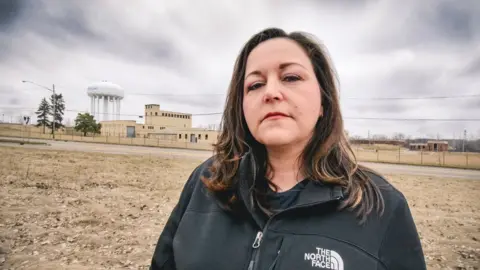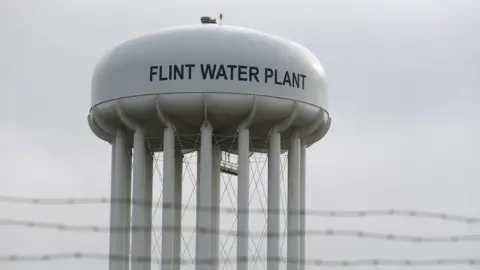Environment prize goes to Flint water activist
 Goldman Prize
Goldman PrizeThe founder of a citizens' movement that helped expose the water crisis in Flint, Michigan, is one of the recipients of the prestigious Goldman Environmental Prize.
Nearly 100,000 residents of Flint were left without safe tap water after lead began leaching into the supply.
Mother of four LeeAnne Walters led a citizens' movement that tested the tap water to expose the health threat.
Tests showed lead levels in her water were seven times the acceptable limit.
In 2014, the water in Ms Walters' home turned brownish and she noticed rashes on her three-year-old twins. Her daughters' hair then fell out in clumps.
Walters spent months reading technical documents about the Flint water system. She then teamed up with environmental engineer Dr Marc Edwards, from Virginia Tech, who helped her conduct extensive water testing in the city.
Corrosive supply
She methodically sampled each zip code in Flint and set up a system to ensure the integrity of the tests, working over 100 hours per week for three weeks.
They showed lead levels as high as 13,200 parts per billion in some parts of the city - more than twice the level classified as hazardous waste by the US Environmental Protection Agency (EPA).
The contamination was traced to the city switching its water supply away from Detroit's system, which draws from Lake Huron, and beginning instead to draw water from the Flint River.
 Reuters
Reuters Reuters
ReutersFlint was in a financial state of emergency and this switch was meant to save the city millions of dollars.
But the water from the Flint River was more corrosive than Lake Huron's water and the pipes began leaching lead, which is a powerful neurotoxin.
The city has since switched back to using Detroit's water system. But Flint continues to wrestle with the aftermath of the crisis, and pipe replacement is ongoing.
In their citation, the jurors praised Ms Walters' "inquisitive, persistent, and logical mind", adding: "Her communal spirit and powerful moral compass proved equally critical to her ability to reach and organize Flint residents and experts alike."
Ms Walters is this year's recipient from North America, but the prize is also awarded to activists from several other global regions.
They include France's Claire Nouvian who led a data-driven campaign against what she and many other activists regarded as the destructive practice of deep sea bottom trawling. Her actions helped secure French support for a ban on the practice.
Another of this year's winners, Khanh Nguy Thi, worked with state agencies in Vietnam to reduce the country's reliance on coal for electricity generation.
